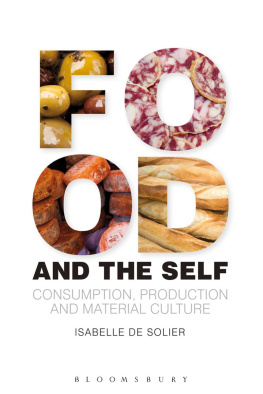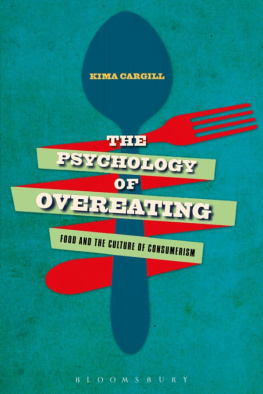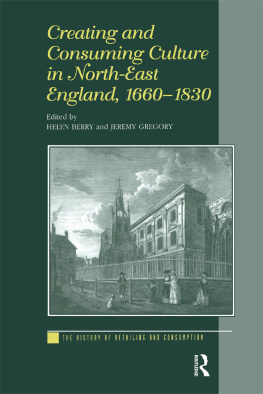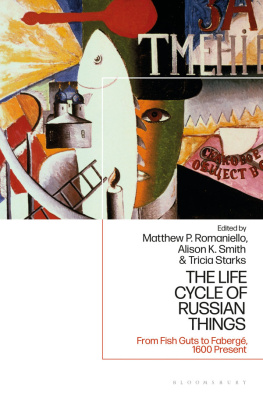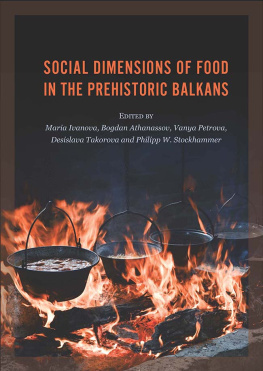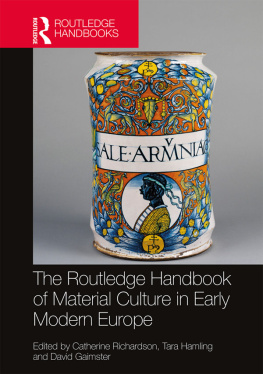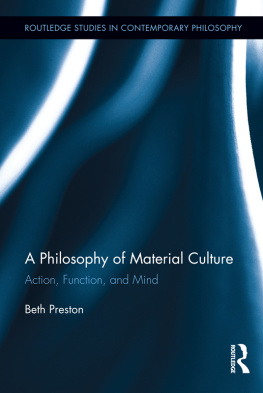Food and the Self
Materializing Culture
Series Editors: Paul Gilroy and Daniel Miller
Barbara Bender, Stonehenge: Making Space
Gen Doy, Materializing Art History
Laura Rival (ed.), The Social Life of Trees: Anthropological Perspectives on Tree Symbolism
Victor Buchli, An Archaeology of Socialism
Marius Kwint, Christopher Breward and Jeremy Aynsley (eds), Material Memories: Design and Evocation
Penny Van Esterik, Materializing Thailand
Michael Bull, Sounding Out the City: Personal Stereos and the Management of Everyday Life
Anne Massey, Hollywood Beyond the Screen: Design and Material Culture
Wendy Joy Darby, Landscape and Identity: Geographies of Nation and Class in England
Joy Hendry, The Orient Strikes Back: A Global View of Cultural Display
Judy Attfield, Wild Things: The Material Culture of Everyday Life
Daniel Miller (ed.), Car Cultures
Elizabeth Edwards, Raw Histories: Photographs, Anthropology and Museums
David E. Sutton, Remembrance of Repasts: An Anthropology of Food and Memory
Eleana Yalouri, The Acropolis: Global Fame, Local Claim
Elizabeth Hallam and Jenny Hockey, Death, Memory and Material Culture
Sharon Macdonald, Behind the Scenes at the Science Museum
Elaine Lally, At Home With Computers
Susanne Kchler, Malanggan: Art, Memory and Sacrifice
Nicky Gregson and Louise Crewe, Second-Hand Cultures
Merl Storr, Latex and Lingerie
Lynn Meskell, Object Worlds in Ancient Egypt: Material Biographies Past and Present
Sophie Woodward, Why Women Wear What They Wear
Daniel Miller (ed.), Anthropology and the Individual: A Material Culture Perspective
Inge Daniels, The Japanese House: Material Culture in the Modern Home
Bloomsbury Academic
An imprint of Bloomsbury Publishing Plc
|
50 Bedford Square
London
WC1B 3DP
UK | 1385 Broadway
New York
NY 10018
USA |
| www.bloomsbury.com |
Bloomsbury is a trade mark of Bloomsbury Publishing Plc
First published 2013
Isabelle de Solier, 2013
All rights reserved. No part of this publication may be reproduced or transmitted in any form or by any means, electronic or mechanical, including photocopying, recording, or any information storage or retrieval system, without prior permission in writing from the publishers.
Isabelle de Solier has identified her right under the Copyright, Designs and Patents Act, 1988, to be identified as author of this work.
No responsibility for loss caused to any individual or organization acting on or refraining from action as a result of the material in this publication can be accepted by Bloomsbury Academic or the author.
British Library Cataloguing-in-Publication Data
A catalogue record for this book is available from the British Library.
ISBN: ePub: 978-0-8578-5435-3
Library of Congress Cataloging-in-Publication Data
de Solier, Isabelle.
Food and the self : consumption, production and material
culture / Isabelle de Solier.
pages cm. (Materializing culture)
Includes bibliographical references and index.
ISBN 978-0-85785-435-3 (epub)
1.FoodSocial aspects.2.FoodEconomic aspects.3.Food supply. 4.Food consumption.5.Material culture.I.Title.
GT2850.D48 2013
394.12dc23 2013021379
A catalog record for this book is available from the Library of Congress.
For Buck
Contents
My sincere thanks go to the foodies who participated in my research, for their interest in the project and their generosity in sharing their experiences with me. I am very grateful to Daniel Miller for recognizing the value of this book project and supporting it from its inception. I thank John Frow, Toby Miller, and Robert Stebbins, and the anonymous reviewers for Bloomsbury, for their extremely helpful feedback on drafts of this book. Thanks also to my very good friends and colleagues Meredith Martin and Alison Huber for their excellent editorial eyes at different stages of the manuscript. To my editorial team at Bloomsbury, I thank Louise Butler and Sophie Hodgson for their patience, interest, and constructive guidance throughout the process. This publication was supported by the Faculty of Arts Publication Subsidy Scheme during my tenure as an Honorary Research Fellow in the Faculty of Arts at the University of Melbourne. Parts of this book have previously been published as Making the Self in a Material World: Food and Moralities of Consumption in Cultural Studies Review . I am very grateful for the support of my friends and my parents, Alex Yarovy and Carol Yarovy. Special thanks go to Naomi Rush and Craig Bourdain for their inspiration and support throughout the project and to Amelia Scurry, Nathan Cherry, Tim Inglefinger, Alyssa Raj, Kaylea Fearn, and Andrew Dawson. Finally, I cannot thank Buck Rosenberg enough for reading and rereading this book and sharing new intellectual insights with me on each occasion. It has lived with us for a long time, and we are both happy for it to finally take on form as a material object and begin a social life of its own.
How do we make a meaningful self-identity in a late modern, postindustrial world? Whether its self-help books telling us how to find our so-called true selves, television programs showing us how to style ourselves, or neoliberal rhetoric stressing that we must take responsibility for ourselves, we live in a time where the individual self is increasingly in focus, and we are being made aware that it is our duty to shape it and maximize it. Because we are no longer afforded the comfort (or restriction) of being defined by tradition, in late modernity the burden of creating identity and meaning in life has shifted onto the individual: we must all create a life of ones own (Beck and Beck-Gernsheim 2001: 22); we have no choice but to choose (Giddens 1991: 81). In postindustrial society, most understandings of this process emphasize the seminal role played by commodities, suggesting that its through consumption that we make ourselves today (Bourdieu 1984; Featherstone 1991; Baudrillard 1998). We make our selections from the array of goods on offer and combine them to shape who we are or who we want to be: selves, then, are made through things.
As scholars have come to focus on consumption, what was once considered the defining feature of self-identityour work, or forms of productionhas become increasingly obscured from theories of self-formation. In postindustrial societies where most peoples work is not materially productive, as it was in the past, does this mean that production no longer matters in self-making? Or alternatively, has production taken on new forms and meanings in peoples lives, precisely as a result of this changing nature of work? This book argues that if we think production no longer matters, we may be looking for it in the wrong place. For as production has lost meaning at work, it has found meaning in leisure: it is in our free time that production finds its expression in self-making for many people today in forms of productive leisure (Gelber 1999). This may involve actually producing thingssuch as a dish, dress, or blog. Or it may involve learning thingssuch as how to cook, sew, or Photoshop digital images. Knowledge and production are integrally linked in productive leisure, for in postindustrial society, new understandings of being productive are bound up with acquiring and expressing knowledge. So if selves today are made through things, I argue that we need to understand how they are shaped not only through consuming things but also through learning and producing things and the values that each of these hold. For there are questions of morality at work here: because of the growing suspicion of consumption in self-making, productive leisure is often regarded as having a higher moral value in this process.

